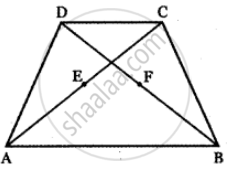Advertisements
Advertisements
Question
If ABCD is a quadrilateral and E and F are the midpoints of AC and BD respectively, then Prove that `vec"AB" + vec"AD" + vec"CB" + vec"CD" = 4vec"EF"`
Solution

Given that ABCD is a quadrilateral.
E and F are the midpoints of AC and BD.
Let `vec"a", vec"b", vec"c"` and `vec"d"` be the position vectors of the vertices A, B, C and D respectively.
`vec"OA" = vec"a"`
`vec"OB" = vec"b"`
`vec"OC" = vec"c"`
and `vec"OD" = vec"d"`
E is the midpoint of AC.
∴ `vec"OE" = (vec"OA" + vec"OC")/2`
`vec"OE" = (vec"a" + vec"c")/2`
F is the midpoint of BD.
∴ `vec"OF" = (vec"OB" + vec"OD")/2`
`vec"OF" = (vec"b" + vec"d")/2`
`vec"AB" + vec"AD" + vec"CB" + vec"CD" = vec"OB" - vec"OA" + vec"OD" - vec"OA" + vec"OB" - vec"OC" + vec"OD" - vec"OC"`
= `2vec"OB" - 2vec"OA" + 2vec"OD" - 2vec"OC"`
= `2vec"b" - 2vec"a" + 2vec"d" - 2vec"c"`
`vec"AB" + vec"AD" + vec"CB" + vec"CD" = 2(vec"b" - 2vec"a" + vec"d" - vec"c")` ......(1)
`vec"EF" = vec"OF" - vec"OE"`
= `(vec"b" + vec"d")/2 - (vec"a" + vec"c")/2`
= `(vec"b" + vec"d"- vec"a" + vec"c")/2`
`vec"EF" = (vec"b" - vec"a" + vec"d" - vec"c")/2`
`2vec"EF" = vec"b" - vec"a" + vec"d" - vec"c"` .......(2)
Fro equation (1) and (2) we have
`vec"AB" + vec"AD" + vec"CB" + vec"CD" = 2(2vec"EF")`
`vec"AB" + vec"AD" + vec"CB" + vec"CD" = 4vec"EF"`
APPEARS IN
RELATED QUESTIONS
Prove that the relation R defined on the set V of all vectors by `vec"a" "R" vec"b"` if `vec"a" = vec"b"` is an equivalence relation on V
If D and E are the midpoints of the sides AB and AC of a triangle ABC, prove that `vec"BE" + vec"DC" = 3/2vec"BC"`
Prove that the line segment joining the midpoints of two sides of a triangle is parallel to the third side whose length is half of the length of the third side
Prove that the line segments joining the midpoints of the adjacent sides of a quadrilateral form a parallelogram
If `vec"a"` and `vec"b"` represent a side and a diagonal of a parallelogram, find the other sides and the other diagonal
If D is the midpoint of the aide BC of a triangle ABC, prove that `vec"AB" + vec"AC" = 2vec"AD"`
If G is the centroid of a triangle ABC, prove that `vec"GA" + vec"GB" + vec"GC" = vec0`
Let A, B, and C be the vertices of a triangle. Let D, E, and F be the midpoints of the sides BC, CA, and AB respectively. Show that `vec"AD" + vec"BE" + vec"CF" = vec0`
Show that the points A(1, 1, 1), B(1, 2, 3) and C(2, – 1, 1) are vertices of an isosceles triangle
Choose the correct alternative:
The value of `vec"AB" + vec"BC" + vec"DA" + vec"CD"` is
Choose the correct alternative:
If `vec"BA" = 3hat"i" + 2hat"j" + hat"k"` and the position vector of is `hat"i" + 3hat"j" - hat"k"`, then the position vector A is
Choose the correct alternative:
If `vec"r" = (9vec"a" + 7vec"b")/16`, then the point P whose position vector `vec"r"` divides the line joining the points with position vectors `vec"a"` and `vec"b"` in the ratio
Choose the correct alternative:
Two vertices of a triangle have position vectors `3hat"i" + 4hat"j" - 4hat"k"` and `2hat"i" + 3hat"j" + 4hat"k"`. If the position vector of the centroid is `hat"i" + 2hat"j" + 3hat"k"`, then the position vector of the third vertex is
